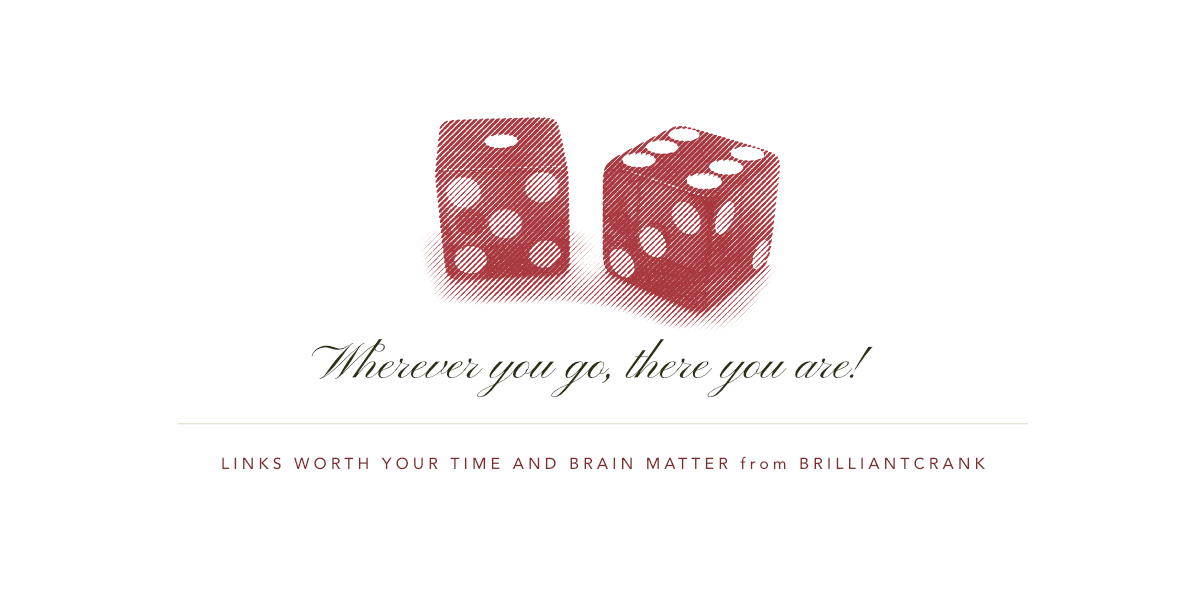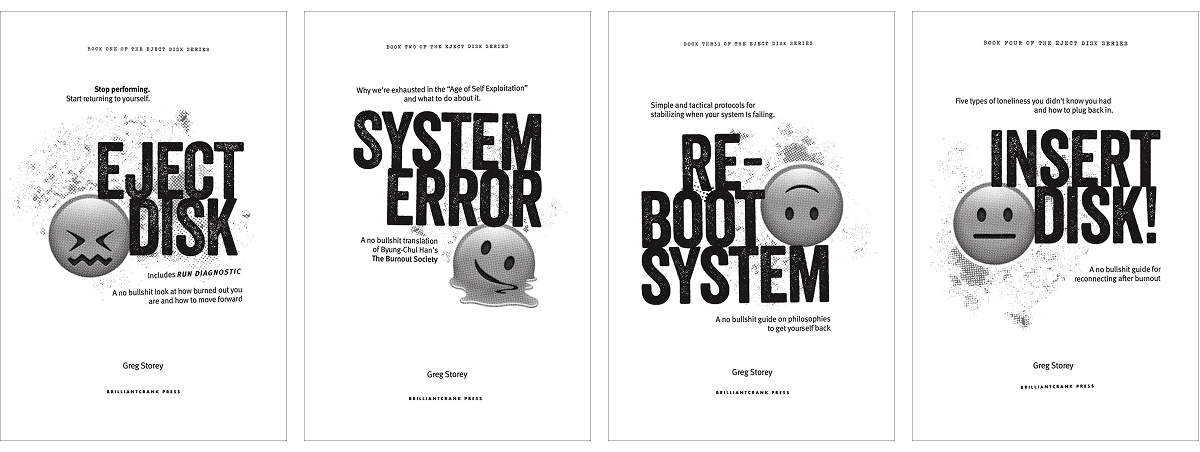The Dice — 038

The last issue of The Dice focused serious burnout and crushing anxiety. I shared six methods and ideas for coping, and hopefully some restoration. A lot has happened in nine months and there is vastly more bullshit going on. The government has turned into a diablo style tire fire, companies are still working to achieve their Minimum Viable Humans level, and just trying to watch some television via streaming subscriptions has become a total nightmare.
While The Dice may have stopped rolling I did not stop writing, but I did focus on a new format: zines (see below). I've researched, written, and created Eject Disk: The Series to shine a light on our burned-out reality. The first one helps you see you're stuck and figure out which kind of stuck. Second one explains why—like, the actual systemic reasons everyone's exhausted. Third one gives you emergency moves for when you're crashing. Fourth one is about reconnecting with people after you've been isolated. It's the whole arc from “'I'm not okay” to “okay, now what.”
I would love to say that we don't need these anymore not when this is going on “46% of U.S. employees have considered quitting because they feel emotionally exhausted or numb at work.” If you're burned out, I've got you. If you know someone who is "numb at work", then point them to Eject Disk.
Ok! Let's see if I remember how to do this right...

In his article Kevin Kelly: The Case for Optimism, Kevin—who has had his finger on the pulse of the future for decades—believes there is a lot to be optimistic about. He argues we should be optimistic because seven "planetary-scale forces" are converging—total urbanization, universal connectivity, ubiquitous AI, sustainable energy, accelerated innovation, bio-engineering, and generational handoff—that will create unprecedented prosperity over the next 25 years.
The only way to make the future optimistic is for good, well-meaning, and humanity-centered people to Neo-jump into the work ahead. Not smashing the machines from outside but from within the system while it's being built and making sure it serves people instead of shareholders.
I'm not sure if becoming or branding ourselves as Luddites is the right move, but I am certain of this: a better future relies on people actively working to stop our systems from extracting value from humans and start providing it.

Ken Burns's newest project The American Revolution debuts today, November 16th, on PBS. If this is new to you, then stop everything and watch the trailer. The timing of this debut is incredible if you consider that production started more than eight years ago. Who could have forecast where the US would be today and so much in need of this reflection on what sparked the ideals that were canonized into the Declaration of Independence and the birth of this nation? I'm sure the extreme left and right will have much to say about this program, but my hope is that the program will shine a light on the delicate balance of new ideas vs. staunch positions that turned into a nation unlike any other.
Real quick: While we're thinking about public broadcasting, remember that these organizations now rely solely on viewer and listener memberships. Consider canceling a streaming account and supporting your local stations.
Switching mediums...the November issue of The Atlantic is dedicated to the upcoming 250th birthday of the United States of America. The entire issue is themed “The Unfinished Revolution”. I highly recommend going to your local magazine purveyor and procuring the issue.

I'm watching the Zohran Mamdani government in New York City closely. His vision matches what I saw working with hundreds of millennials ten years ago. But it's this Cory Doctorow observation about one of his transition team members, Lina Khan, that signals the kind of difference that has the potential to create real, lasting change.
Khan's already picked out some "unconscionable" practices that the mayor has "standalone authority" to address: everything from hospitals that price gouge on over-the-counter pain meds to sports stadiums that gouge fans on hot dogs and beer. She's taking aim at "algorithmic pricing" (when companies use commercial surveillance data to determine whether you're desperate and raise prices to take advantage of that fact) and junk fees (where the price you pay goes way up at checkout time to pay for a bunch of vague "services" that you can't opt out of).
Meanwhile closer to home, Seattle elected Katie Wilson, another progressive millennial who staked her campaign on affordability. Hey, maybe we can finally start to chip away at the crusty, old two party system and its members who sold their souls long ago. Perhaps Kevin is right to be optimistic.
And now a word from our sponsor...

Eject Disk: The Series is now available by your's truly. There are four zines. Each one works alone, but together they build a path: recognition (Eject Disk), understanding why it happened (System Error), stabilizing when you're crashing (Reboot System), and reconnecting without losing yourself (Insert Disk).
Get them today in digital or print.

We Used to Read Things in This Country by Noah McCormack is a must-read and a sorely needed wake-up call (that will fall on deaf ears no doubt). Noah traces how literacy has always been about power—who has it, who's denied it, and why. Turns out we're not "losing" reading culture by accident. We're watching a deliberate return to a world where most people can't think analytically enough to see they're being robbed, financially and intellectually.
The newspaper “was a form of literacy that appealed to non-elite readers and provided them with information as well as entertainment. In many ways, the current era of Trump results from the fact that it's easier to put your hand in the next guy's pocket if he's illiterate.”
It's probably a good time to read, share, and promote Cory Doctorow's new book on Enshittification, or at the very least this piece in the New Yorker. Also—and I can't believe I'm going to do this—here's a thirty-minute lecture by Cory on How Enshittification Conquered the 21st Century and How We Can Overthrow It. Long sigh.

Good news, everyone! After a successful Kickstarter campaign, Marc Maron's WTF podcast is going to be turned into a graphic novel called WTF is a Podcast. Marc recorded over 1,600 episodes with a range of guests, getting into some frank conversations well beneath the surface of most interviews.
The likes of Barack Obama, Robin Williams, and Lorne Michaels have all featured as guests over the years, and their tales could be among the ones told in print. Maron is working with graphic novel publisher Z2 on the project, alongside WTF's long-time producer Brendan McDonald and cartoonist Brian Box Brown, to capture the story.
The graphic novel will cover the story of WTF from the start in 2004 to the conclusion earlier this year in 2025. Back when I had a commute, Marc's podcast got me through many hours of bad traffic, so I'm excited to see how this turns out and hope that it inspires more print spin-offs from other shows.
Related: The USPS hired graphic novel savant Chris Ware to design a sheet of stamps for its 250th anniversary. The results are nothing short of what you would expect from Ware: perfect. Each stamp shows the day in the life of a postal worker delivering the mail. It's a unique piece of art that should not be missed if you haven't already picked up a set.

wI don’t know how many years I went without ever thinking about the Trapper Keeper, and then it comes up twice in one week in separate conversations. McSweeney's Issue 80 is a “1980s rainbow-hued, coral-reef-clad, dolphin-inhabited, drowned-world three-ring oversized-school-binder-inspired volume.”
As awesome as this is, the original idea was for a Filofax, but when the art director pitched the idea to editors, their minds went right for the Trapper Keeper.
I presented the idea to the editors, and someone thought I was describing a Trapper Keeper. There was so much excitement for the Trapper Keeper during that presentation that we immediately switched gears and I started collecting old Trapper Keepers.
Grow a mullet and buy your copy of McSweeney's Trapper Keeper.
The Trapper Keeper debuted in 1981 in Wichita, Kansas, with this television commercial. The response was overwhelming and turned into an instant Gen X icon. It was heavily influenced by the PeeChee folder, which at the time was only sold in the western United States, leaving the rest of the country wide open for a new product.
Published in Tacoma, Washington while listening to Guero by Beck.

Member discussion